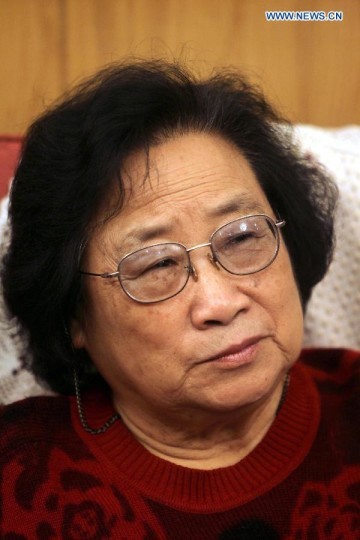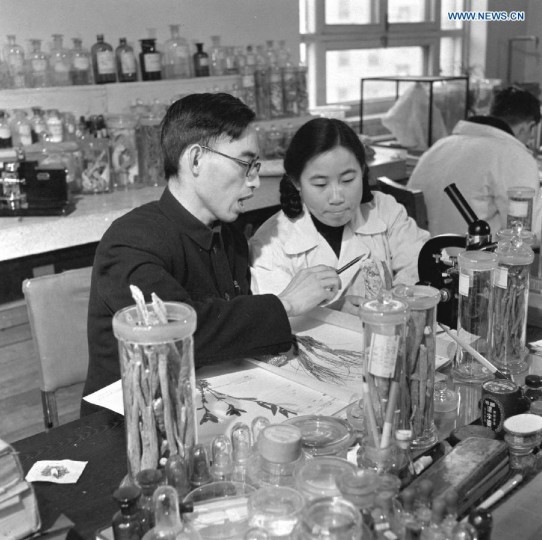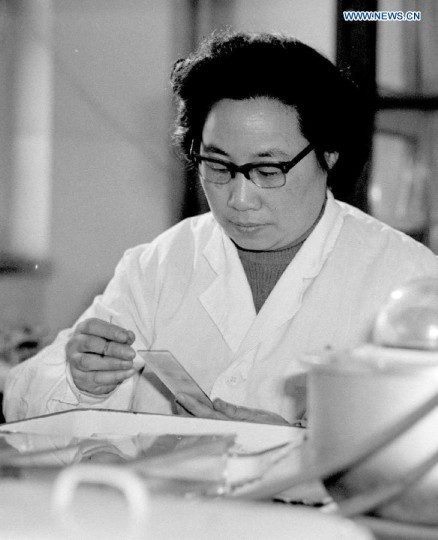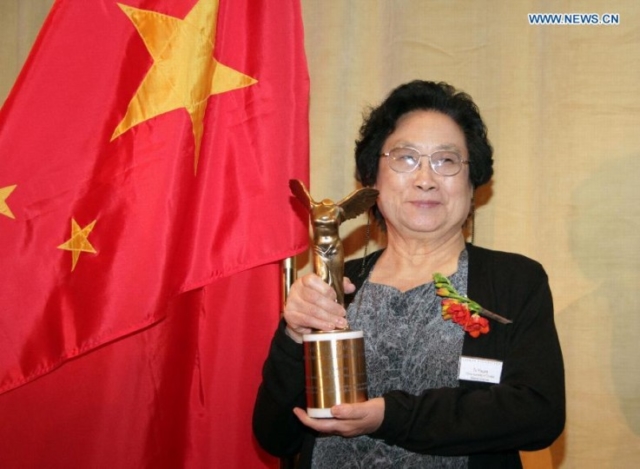The Nobel judges in Stockholm awarded the prestigious Nobel Prize in medicine to Irish-born William Campbell, Satoshi Omura of Japan and Tu Youyou on Monday, the first-ever Chinese medicine laureate. Here is some background on Tu Youyou.
Tu was cited for discovering artemisinin, a drug that’s now the primary treatment against malaria, saving millions of lives worldwide. Inspired by Chinese traditional medicine, she made her discovery while working on a malaria project for the Chinese military.

File photo taken on Nov. 15, 2011 shows Chinese pharmacologist Tu Youyou speaking to media after returning from the United States to receive the Lasker Award, a prestigious U.S. medical prize, in Beijing, capital of China.(Xinhua/Jin Liwang)
Tu, 84, is chief professor at the China Academy of Traditional Chinese Medicine. As a junior researcher, she was recruited by the Chinese government to work on a military project in 1969 to find malaria drugs. She turned to herbal medicine to discover a new malarial agent in an extract from the sweet wormwood plant. The agent, artemisinin (pronounced ar-tuh-MIHS’-ihn-ihn), was highly effective against malaria, a disease that was on the rise in the 1960s.
Malaria is a mosquito-borne disease that still kills around 500,000 people a year, mostly in Africa, despite efforts to control it.
Colin Sutherland, reader in parasitology at London School of Hygiene and Tropical Medicine, said that the impact of artemesinin had been profound. It’s so widely used across the world that there’s a risk of resistance problems. “The writing is on the wall already. We probably have about five to 10 years of effective use of artemesinins before resistance becomes a problem,” he said.

Undated file photo shows Tu Youyou (R, front), a pharmacologist with the China Academy of Chinese Medical Sciences, working with professor Lou Zhicen to study the traditional Chinese medicine, in 1950s. (Xinhua)
“WHO welcomes the decision to award the Nobel Prize for Medicine for the discovery of artemisinin. It is a great tribute to the contribution of the Chinese scientific community in the fight against malaria. Artemisinin compounds have become the mainstay of malaria treatment over the past 15 years. They are used in combination therapy to reduce the risk of the development of resistance. All countries in need with P. falciparum malaria have adopted artemisinin-based combination therapies as first-line treatment for malaria and have made these medicines available in the public sector. Since 2000, more than 1 billion artemisinin-based treatment courses have been administered to malaria patients,” says the latest statement by WHO.
WHO says artemisinin resistance has already been confirmed in Cambodia, Laos, Myanmar, Thailand and Vietnam.

Undated file photo shows Tu Youyou, a pharmacologist with the China Academy of Chinese Medical Sciences, working to make artemisinin, a drug therapy for malaria, in 1980s. (Xinhua/Yang Wumin)
There have been several previous Nobel Prizes for malaria research, including the 1902 award to British army surgeon Ronald Ross, who discovered the disease is transmitted by mosquitos.
The last time a Chinese citizen won a Nobel was in 2012, when Mo Yan got the literature award. But China has been yearning for a Nobel Prize in science. This was the first Nobel Prize given to a Chinese scientist for work carried out within China. “This is indeed a glorious moment,” said Li Chenjian, a vice provost at prestigious Peking University. “This also is an acknowledgement to the traditional Chinese medicine, for the work began with herbal medicine.”
Stephen Ward, deputy director of Liverpool School of Tropical Medicine, said the prize confirms that Chinese scientists “did fantastic work in the 1960s even when they were effectively ignored by the rest of the world.”
Story compiled with information from The Associated Press and Xinhua.
Chinese scientist wins Nobel Prize in Medicine
For the first time, a Chinese scientist has won the Nobel Prize in Medicine. 84-Year-old Tu Youyou studied traditional Chinese medicine to create a new treatment for malaria. CCTV America’s Jim Spellman filed this report.

 CGTN America
CGTN America File photo taken on Sept. 23, 2011 shows Chinese Pharmacologist Tu Youyou posing with her trophy after winning the Lasker Award, a prestigious U.S. award, in New York, the United States. China’s Tu Youyou, Irish-born William Campbell, and Japan’s Satoshi Omura jointly won the 2015 Nobel Prize for Physiology or Medicine, the Nobel Assembly at Sweden’s Karolinska Institute announced on Monday.(Xinhua/Wang Chengyun)
File photo taken on Sept. 23, 2011 shows Chinese Pharmacologist Tu Youyou posing with her trophy after winning the Lasker Award, a prestigious U.S. award, in New York, the United States. China’s Tu Youyou, Irish-born William Campbell, and Japan’s Satoshi Omura jointly won the 2015 Nobel Prize for Physiology or Medicine, the Nobel Assembly at Sweden’s Karolinska Institute announced on Monday.(Xinhua/Wang Chengyun)
